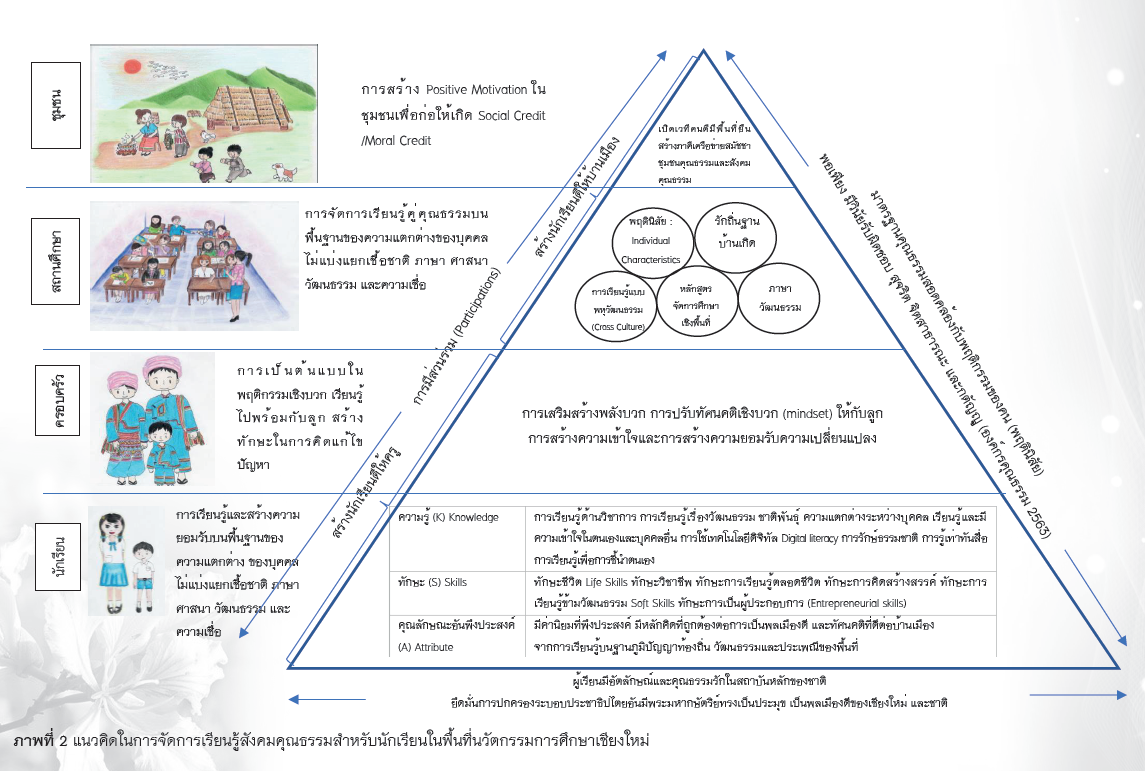การพัฒนารูปแบบการเรียนรู้สู่สังคมคุณธรรมสำหรับนักเรียนในพื้นที่นวัตกรรมการศึกษาเชียงใหม่
Main Article Content
บทคัดย่อ
การวิจัยนี้มีวัตถุประสงค์เพื่อ 1) ศึกษาสภาพและความต้องการในการเรียนรู้สู่สังคมคุณธรรมสำหรับนักเรียนในพื้นที่นวัตกรรมการศึกษาเชียงใหม่ 2) พัฒนารูปแบบการเรียนรู้สู่สังคมคุณธรรมสำหรับนักเรียนในพื้นที่นวัตกรรมการศึกษาเชียงใหม่ และ 3) ศึกษาผลการใช้รูปแบบการเรียนรู้สู่สังคมคุณธรรมสำหรับนักเรียนในพื้นที่นวัตกรรมการศึกษาเชียงใหม่ กลุ่มเป้าหมายคือโรงเรียนแกนนำในพื้นที่นวัตกรรมการศึกษาจังหวัดเชียงใหม่ จำนวน 104 โรงเรียน ดำเนินการวิจัยเป็น 3 ระยะคือ ระยะที่ 1 ศึกษาสภาพและความต้องการในการเรียนรู้ โดยการศึกษาเอกสาร ถอดบทเรียน การสัมภาษณ์ การประชุมกลุ่ม และการสอบถาม ระยะที่ 2 การพัฒนารูปแบบการเรียนรู้ โดยการยืนยันรูปแบบการเรียนรู้จากผู้เชี่ยวชาญ และระยะที่ 3 ศึกษาผลการใช้รูปแบบการเรียนรู้สู่สังคมคุณธรรมสำหรับนักเรียน โดยการทดสอบก่อนเรียนและหลังเรียน และรายงานผลการนำรูปแบบไปใช้ในการจัดการเรียนรู้ เครื่องมือการวิจัย ได้แก่ แบบบันทึกการถอดบทเรียน แบบสอบถาม แบบบันทึกการสนทนากลุ่ม แบบบันทึกการสัมภาษณ์ แบบประเมินความเหมาะสมของกิจกรรม แบบทดสอบก่อนเรียนและหลังเรียน แบบประเมินความพึงพอใจ และแบบบันทึกการคืนข้อมูลกลับสู่ชุมชน วิเคราะห์ข้อมูลโดยการวิเคราะห์และสังเคราะห์เนื้อหา ค่าเฉลี่ย ส่วนเบี่ยงเบนมาตรฐาน การวิเคราะห์ค่าดัชนีจัดเรียงลำดับความสำคัญ และเปรียบเทียบคะแนนเฉลี่ยระหว่างคะแนนผลการทดสอบหลังเรียนกับคะแนนเฉลี่ยก่อนเรียน โดยใช้ t-test (Dependent Samples)
ผลการวิจัยพบว่า 1) สภาพและความต้องการในการเรียนรู้สู่สังคมคุณธรรมสำหรับนักเรียนในพื้นที่นวัตกรรมการศึกษาเชียงใหม่ในภาพรวม สภาพการดำเนินการอยู่ในระดับมาก ( = 4.04, S.D.= 0.904) และความต้องการในการเรียนรู้อยู่ในระดับมาก (
= 4.11, S.D.= 0.858) 2) การพัฒนารูปแบบการเรียนรู้สู่สังคมคุณธรรมสำหรับนักเรียนในพื้นที่นวัตกรรมการศึกษาเชียงใหม่พบว่า รูปแบบการเรียนรู้สู่สังคมคุณรรมสำหรับนักเรียนในพื้นที่นวัตกรรมการศึกษาเชียงใหม่ ได้ผ่านการยืนยันความเหมาะสมของรูปแบบการเรียนรู้จากผู้เชี่ยวชาญ ประกอบด้วยกิจกรรมการจัดการเรียนรู้ วัตถุประสงค์ เนื้อหาสาระเน้นการพัฒนาสังคมคุณธรรม ความเป็นคนไทย 4.0 และทักษะชีวิตในศตวรรษที่ 21 กระบวนการจัดกิจกรรม และการวัดและการประเมินผล และ 3) การใช้รูปแบบการเรียนรู้สู่สังคมคุณธรรมสำหรับนักเรียนในพื้นที่นวัตกรรมการศึกษาเชียงใหม่ เป็นการนำรูปแบบการเรียนรู้สู่การปฏิบัติเพื่อถ่ายทอด 10 กิจกรรมการเรียนรู้ ตามองค์ประกอบ 5 ด้าน พบว่า ผู้เรียนมีผลสัมฤทธิ์การเรียนด้านความรู้และทักษะหลังเรียนสูงกว่าก่อนเรียนอย่างมีนัยสำคัญทางสถิติที่ระดับ 0.05 และมีเจตคติที่ดีต่อรูปแบบและกระบวนการเรียนรู้ ระดับมากที่สุด (
= 4.73, S.D.= 0.504)
Downloads
Article Details

อนุญาตภายใต้เงื่อนไข Creative Commons Attribution-NonCommercial-NoDerivatives 4.0 International License.
เอกสารอ้างอิง
Center for Morality Promotion (Public Organization). (2023a). Complete report implementation of a report about morality in Thai society in 2023. Thai Behavioral System Innovation Project. Bangkok: TRIS Academy of Management TRIS Corporation. [In Thai]
Center for Morality Promotion (Public Organization). (2023b). Research report on developing and surveying the moral situation using morality indicators. Bangkok: Center for Morality Promotion (Public Organization). [In Thai]
Center for Morality Promotion (Public Organization). (2023c). We all depend on each other. Knowledge, education, and development of the ecosystem of moral space. Bangkok: Center for Morality Promotion (Public Organization). [In Thai]
Chiang Mai Governor Office. (2023). Summary of Chiang Mai Province 2023. Chiangmai: Strategy for Local Education Development Subdivision Chiang Mai Province. [In Thai]
Chiang Mai Primary Educational Service Area Office 4. (2021). Operational guidelines for promoting safety and measures for safe schools (Safety School) leading to a Happy School. Chiangmai: Chiang Mai Primary Educational Service Area Office 4. [In Thai]
Chiangmai Provincial Social Development and Human Society Office. (2021). Performance report for year 2021. Chiangmai: Chiangmai Provincial Social Development and Human Society Office. [In Thai]
Junnoi, P., Chomphucome, W., Puenphasook, P., & Nontapa, R. (2016). Ways of establishing activities for improving merit and morality of students at private universities in Chiang Mai. FEU Academic Review Journal, 10(4), 261-273. [In Thai]
Khampol, P. (2019). The development of an instructional model to enhance undergraduate students’ ethics (Doctoral dissertation, Graduate School, Silpakorn University). [In Thai]
Kongcharoen, W. (2012). Morality and Thai society. Bangkok: Wankaen Edutainment Co., Ltd. [In Thai]
Likert, R. (1967). The method of constructing and attitude scale. In Attitude Theory and Measurement. New York: Wiley & Son.
Mongkolsubsakul, V. (2022). Development of acceptance and recognition of rights of LGBTIQ+ people. Journal of Humanities and Social Sciences, Khon Kaen University, 39(3), 109-138. [In Thai]
Nisai, S., Karakasikhawitee, M., & Srilapo, N. (2020). The moral in the marginalized schools along the Northern borders. Social Sciences Research and AcademicJournal, 15(2), 1-14. [In Thai]
Nookhong, J., & Piriyasurawong, P. (2014). Self-directed learning using problem-based learning to develop problem-solving skill. Technical Education Journal King Mongkut’s University of Technology North Bangkok, 5(2), 185-190. [In Thai]
Preetiprasong, I. (2017). True about the risks in the lives of young people. Retrieved from http://gotoknow.org/blog/virtualcommunitymanagement/288469 [In Thai]
Punthiya, P. (2022). Attitude, perception, and awareness of human rights and gender equality of LGBTQ+ community in Thailand. (Master of Arts thesis, Faculty of Economics, Maejo University). [In Thai]
Rangsiyanon, K. (n.d.). Moral and ethical development in early childhood: Starting with the heart. Retrieved from https://preschool.or.th/content/documents/moral-development -from- the-heart.pdf [In Thai]
Rattanapirom, C. (2018). Multiculturalism: Harmonious differences. Retrieved from https://www.constitutional court.or.th/occ_web/ewt_dl_link.php?nid=1240 [In Thai]
Sritrakool, S. (2015). Concept and proposals for the self-governing of Chiangmai Province, Thailand. (Master thesis, Puey Ungphakorn School of Development Studies, Thammasat University). [In Thai]
Surat, P. (2018). Cyber bullying in socio-cultural dimensions: Case study of Generation Z among Thai youths (Doctoral dissertation, Behavioral Science Research Institute, Srinakharinwirot University). [In Thai]
Tangkananurak, W. (n.d.). The protection of children’s right in Thailand (Research report). Bangkok: College of the Constitutional Court. [In Thai]
The Secretariat of The House of Representatives. (n.d.). Citizenship in a democratic way. Bangkok: Office of the Secretary of the House of Representatives. [In Thai]
Wasana, P., & Leetagool, S. (2021). Development of training program for life skills by experiential learning for ethnic youth in Chiang Rai Province. Payap University Journal, 30(2), 118–134. [In Thai]
World Health Organization (WHO). (1997). Life skill education for children and andolescents in school. Geneva: WHO.
Yamane, T. (1973). Statistics: An introductory analysis. (3rd ed.). New York: Harper & Row.


